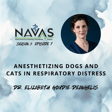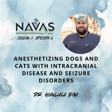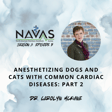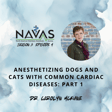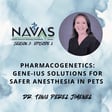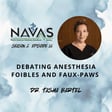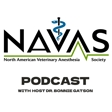
Digesting 2020 AAHA Anesthesia and Monitoring Guidelines with Dr. Ioannis Savvas
What fasting recommendations are you making for your elective anesthetic procedures? Are you recommending that all your patients be fasted overnight? This has been recommended by veterinarians to countless dog and cat owners for years. However, our human counterparts have changed these recommendations in recent years to shorter episodes of fasting before general anesthesia. The most recent anesthesia guidelines provided by American Animal Hospital Association have suggested a different fasting protocol for small animal patients prior to general anesthesia that look awfully similar to the updated human recommendations. What is the evidence that veterinarians should follow suit, especially given the intricate differences between the human and animal gastrointestinal systems?
To help us digest this huge topic is Dr. Ioannis Savvas, Professor of Veterinary Anaesthesia, Analgesia, and Intensive Care at School of Veterinary Medicine, Aristotle University of Thessaloniki and dedicated researcher specializing in the complex details of how general anesthesia impacts the gastrointestinal tract of dogs and cats. With host Dr. Bonnie Gatson, they will discuss the impact of general anesthesia on gastrointestinal motility, how often reflux and regurgitation occur in anesthetized companion animals, and strategies to mitigate these gastrointestinal complications. And of course, they will discuss what we know and don’t know when it comes to preanesthetic fasting protocols for dogs and cats.
We invite our listeners to check out articles mentioned in today’s episode: 2020 AAHA Anesthesia and Monitoring Guidelines for Dogs and Cats
If you like what you hear, we have a couple of favors to ask of you:
Become a member at North American Veterinary Anesthesia Society (NAVAS) for access to more anesthesia and analgesia educational and RACE-approved CE content.
Spread the word. Share our podcast and FB/IG posts, re-tweet, post something on a network or a discussion forum, or tell a friend over lunch. That would really help us achieve our mission: Reduce mortality and morbidity in veterinary patients undergoing sedation, anesthesia, and analgesia through high-quality, peer-reviewed education.
We also ask our listeners to save the date for the NAVAS Virtual Spring Symposium on April 27th and 28th, 2024. For more information about the program, visit the NAVAS Spring Symposium website. Dr. Savvas will be one of our featured speakers during the symposium talking more about adverse gastrointestinal effects of general anesthesia.
Thank you to our sponsor, Dechra - learn more about the pharmaceutical products Dechra has to offer veterinary professionals, such as Zenalpha.
If you have questions about this episode or want to suggest topics for future episodes, reach out to the producers at education@mynavas.org.
All opinions stated by the host and their guests are theirs alone and do not represent the thoughts or opinions of any corporation, university, or other business or governmental entity.
The NAVAS Podcast is published monthly on or near the 15th of the month.
Special thanks to Chris Webster for editing, producer Maria Bridges, and Saul Jimenez for IT support in making this podcast a reality.
